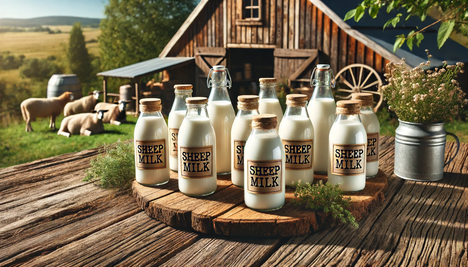Sheep's milk

Sheep's milk is the milk of sheep, which can be consumed by both humans and animals. It has a different nutritional composition than cow's milk and offers some health benefits, but also some disadvantages. In this article, you'll learn everything you need to know about sheep's milk for dogs.
What is sheep's milk?
Sheep's milk is the milk that sheep produce for their lambs. It has been kept as a pet by humans for over 8000 years and is mainly used to make cheese. Sheep's milk has a much higher fat and protein content than cow's milk and is therefore the highest calorie milk of all mammals. It also contains more calcium and more of the fat-soluble vitamins A and E. It also contains many other vitamins and minerals, such as vitamin C, B6, B12, riboflavin, potassium, phosphorus, sodium and magnesium.
What are the benefits of sheep's milk for dogs?
Sheep's milk can have several benefits for dogs, especially if they suffer from certain health problems or require a special diet. Here are some examples:
- Sheep's milk is easy to digest because it contains more short- and medium-chain fatty acids, which are more easily absorbed in the intestines and metabolized more quickly in the body than the long-chain fatty acids found in cow's milk. This can be helpful for dogs with stomach, intestinal, kidney or liver problems.
- Sheep's milk causes fewer allergies than cow's milk because it contains less casein. Casein is a protein that can trigger an allergic reaction in some dogs. However, sheep's milk also contains whey proteins, which can also be allergenic. It is therefore important to test the dog's individual tolerance.
- Sheep's milk nourishes and moisturizes the skin and scalp in a natural way. This can be useful for dogs with skin or scalp problems such as eczema, dandruff or itching.
- Sheep's milk is valuable for building up the immune system because it contains many vitamins and trace elements, which the sheep absorb through their long digestive tract and pass on to the dog via the milk. This can be beneficial for dogs with a weakened immune system or an increased susceptibility to infection.
What are the disadvantages of sheep's milk for dogs?
Sheep's milk also has some disadvantages that you should be aware of before giving it to your dog. Here are some examples:
- Sheep's milk is very high in calories and can therefore lead to overweight or obesity if given in too large quantities or too frequently. This in turn can lead to other health problems such as diabetes, cardiovascular disease or joint problems.
- Sheep's milk contains milk sugar (lactose), which can lead to digestive problems such as diarrhea, flatulence or abdominal pain in some dogs. This is because many dogs do not produce enough lactase, an enzyme that breaks down lactose. Lactose intolerance can vary depending on the breed, age or individual predisposition of the dog.
- Sheep's milk has a typical smell and taste that comes from capric acid, also known as bock acid. This can be unpleasant or repulsive for some dogs. In addition, the smell and taste of sheep's milk can be transferred to the dog's breath or coat, which may be undesirable for the owner.
How can sheep's milk be used for dogs?
Sheep's milk can be used as a supplement to the dog's normal diet if it is good for him and he likes it. However, there are a few points to bear in mind to ensure the optimum quantity and quality:
- Sheep's milk should always be fresh or pasteurized to minimize the risk of bacteria or germs. Raw milk can contain salmonella, E. coli or other pathogens that can be dangerous for dogs.
- Sheep's milk should always be given in moderation to avoid overdosing or weight gain. The recommended amount depends on the dog's size, weight and activity level. As a rule of thumb, a dog should not get more than 10 percent of its daily calorie requirement from sheep's milk. This corresponds to around 50 to 100 milliliters per day for a medium-sized dog.
- Sheep's milk should always be introduced slowly to test the dog's tolerance. You should start with small amounts and gradually increase them if the dog shows no negative reactions. If the dog shows diarrhea, vomiting or other symptoms of intolerance or allergy, the sheep's milk should be discontinued immediately.
- Sheep's milk should always be used as a supplement and not as a substitute for the dog's normal diet. It cannot provide all the nutrients the dog needs and can lead to deficiencies if it is the main source of nutrition. It can also interfere with the absorption of other nutrients in the diet if given at the same time. Therefore, sheep's milk should always be given between meals or as a reward.
Sheep's milk is a special type of milk that can have some advantages for dogs, but also some disadvantages. It is easy to digest, causes fewer allergies, cares for the skin and strengthens the immune system. However, it is also very high in calories, contains lactose and has a special smell and taste. Whether or not you want to give your dog sheep's milk depends on his individual tolerance, taste and state of health. You should always pay attention to the quality, quantity and introduction of sheep's milk in order to do the best for your dog.
If you notice any signs of hypersensitivity or poisoning in your dog, you should see your vet immediately. We are not a substitute for a vet, but we try to be as accurate as possible. Every dog reacts differently and we recommend you get a second opinion or consult your vet if in doubt.
Stay healthy and take good care of your four-legged friend!😊